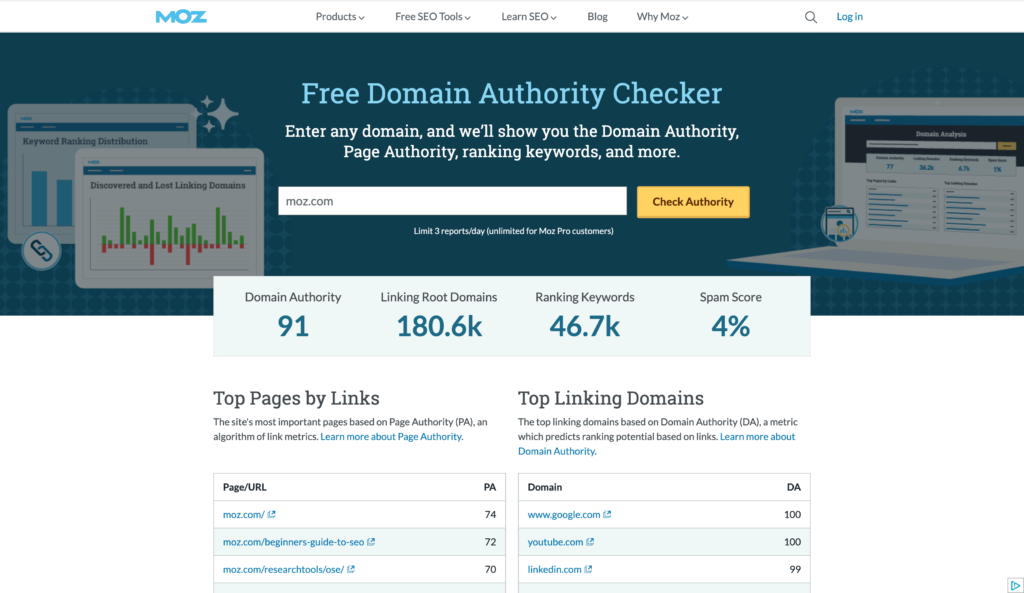
As a website owner, you’re probably familiar with the importance of ranking high in search engine results pages (SERPs). After all, the higher your website ranks, the more traffic you can attract, which can lead to more leads, sales, and revenue for your business. However, achieving a high ranking in SERPs is no easy feat. Increasing Domain Authority can help your website rank, as this metric includes important parameters for ranking your site as an authoritative and quality resource by search engines.
In this article, we’ll dive deeper into what domain authority is, why it’s important, and how you can increase it for your own website using proven strategies. Whether you’re a small business owner, a digital marketer, or a blogger, understanding and improving your domain authority can help you stand out in a crowded online landscape and reach your target audience more effectively. So, let’s get started.
What is Domain Authority?
Domain authority is a metric that was created by Moz, a popular SEO software company, to predict how well a website will rank on search engine results pages (SERPs). It’s based on a logarithmic scale from 0 to 100, with higher scores indicating a stronger online presence and a greater likelihood of ranking well in search results.
Moz calculates domain authority using a complex algorithm that takes into account various factors, such as the quality and quantity of inbound links, the relevance and authority of the linking websites, and the overall trustworthiness of the domain. Essentially, the more high-quality, relevant, and trustworthy backlinks a website has, the higher its domain authority (DA) score will be.
It’s important to note that domain authority is not the same as page authority, which is a metric that measures the likelihood of a specific page ranking well in search results. Instead, domain authority measures the overall strength and website authority as a whole.
By understanding what domain authority is and how it’s calculated, website owners can gain valuable insights into the health and performance of their online presence.
How Important is Domain Authority?
Domain authority is an important metric for website owners because it can directly impact their online visibility and success, particularly for those who rely on organic search traffic to drive their online business. Here are a few reasons why domain authority is important:
- 1. Better Rankings: Websites with higher domain authority scores are more likely to domain rank well in search results, which can lead to more organic traffic and exposure for your business.
- 2. Increased Credibility: A high domain score can make your website appear more trustworthy and credible to both search engines and users, which can improve your brand reputation and attract more leads and customers.
- 3. Competitive Advantage: By improving your domain authority, you can gain a competitive advantage over other websites in your niche, which can help you stand out and attract more traffic and leads.
- 4. More Linking Opportunities: Websites with high domain authority scores are more likely to attract high-quality inbound links from other reputable sites, which can further boost their authority and visibility.
- 5. Long-term Benefits: Improving your domain authority is a long-term strategy that can pay off over time, even if it takes some time to see results. By investing in your website’s authority and credibility, you’re setting yourself up for long-term success and growth.
Overall, domain authority is an important metric to track and improve because it can directly impact the success of your online business. This is because Google’s ranking systems take into account various parameters of this metric to determine the relevance and reliability of your website. Therefore, by increasing your website’s Domain Authority, you can improve your website’s chances of ranking higher on search engine results pages and ultimately attract more organic traffic to your website.
How to Check Domain Authority?
To improve your website’s domain authority, it’s important to know where you currently stand. There are several popular SEO tools you can use to check your DA score, including Ahrefs, Moz, SEMrush, and Majestic. Here’s how to use each tool to check your domain authority:
- • Ahrefs: Ahrefs is a popular SEO tool that offers a variety of features, including a Domain Rating (DR) score. DR is slightly different from DA because it shows the strength of a website’s backlink profile based on its size and quality, but they are essentially similar and are often considered both or interchangeably. The Ahrefs Site Explorer tool will show your DR score, the number of backlinks, referring domains, and organic search traffic.
- • Moz: Moz was the creator of domain authority, so it’s no surprise that they offer an SEO domain authority checker tool. The Moz Link Explorer tool will show you your domain authority score as well as the number of backlinks and top linking domains.
- • SEMrush: SEMrush is another popular SEO tool that offers the Authority Score used to measure the overall quality of a URL and its impact on SEO. The score is based on the number of backlinks, referring domains, organic search traffic, and other data. The SEMrush’s Domain Overview tool will show your domain’s authority score, organic search traffic, and top organic search keywords.
- • Majestic: Majestic is an SEO tool that specializes in backlink analysis, but it also has the Trust Flow, a score based on how many links a domain gets from a set of trusted sites. The Majestic Site Explorer tool will show your domain’s Trust Flow, Citation Flow, the number of backlinks and referring domains.
By using one of these tools to check your domain authority, you can get a better understanding of where you currently stand and what areas you need to improve.

How to Increase Domain Authority in 11 Steps
Now that you know how to check your domain authority, it’s time to focus on increasing it. Here are 11 proven steps you can take to improve your website’s domain authority:
Step 1: Develop Compelling, High-Quality Content
One of the most effective ways to improve your website’s domain authority is by consistently creating high-quality, engaging content that provides value to your target audience. Make sure your content is original, informative, and well-written, and be sure to use relevant keywords to optimize for search engines.
Step 2: Conduct a Thorough Link Analysis
Perform a thorough backlink audit to identify any low-quality, spammy, or broken links on your website. Use a tool like Ahrefs or Moz to identify any links that are harming your website’s reputation and remove them.
Step 3: Remove Spammy Backlinks
If you’ve identified any spammy backlinks during your backlink audit, reach out to the website owners and request that they remove the link. If they don’t respond or refuse to remove the link, you can use Google’s Disavow Tool to disavow the link and prevent it from harming your website’s reputation.
Step 4: Disavow Toxic Backlinks
Toxic backlinks can severely harm your website’s domain authority, so it’s important to find toxic backlinks and remove them. One of the most effective ways to do this is by using Google Search Console. It provides a Disavow Tool that allows you to upload a list of links you want to disavow, indicating to Google that you don’t want them to be taken into account when assessing your website’s authority.
Step 5: Perform an On-Page SEO Audit
Perform an on-page SEO audit to identify any issues with your website’s content, meta tags, headings, images, and other on-page elements. Make sure your website is optimized for your target keywords and that your content is structured in a way that is easy for both users and search engines to understand.
Step 6: Perform a Technical SEO Audit
Conduct a comprehensive technical SEO analysis to pinpoint any potential problems with your website’s code, page load speed, mobile-friendliness, and other technical aspects. Ensure that your website is optimized for search engines and provides a smooth user experience for your audience.
Step 7: Correct On-Page and Technical Issues
Fix any issues that you identified during your on-page and technical SEO audits. This may include SEO content optimization, fixing broken links, improving page speed, and making your website more mobile-friendly.
Step 8: Start Building High-Quality Backlinks
The backlink importance cannot be underestimated. Start building high-quality, relevant backlinks to your website. This can include guest blogging, broken link building, and other link building tactics.
Step 9: Write Outreach Content to Attract Backlinks
Create high-quality outreach content that provides value to your target audience and encourages other high domain authority websites to link back to your website. This can include infographics, guides, and other shareable content.
Step 10: Promote Your Content on Social Media
Share your content on social media to increase visibility and drive traffic to your website. This will also help to build your brand and increase your website’s reputation.
Step 11: Consistently Repeat Link Building and Content Strategies
Continuously monitor and improve your website’s content and link building strategy. Make adjustments as needed and continue to focus on creating high-quality, engaging content that provides value to your target audience.
By following these 11 steps, you can significantly improve your website’s domain authority and increase your search engine visibility.

The Most Useful Tips to Improve Your Domain Authority
Improving your website’s Domain Authority takes time and effort, but there are some practical steps you can take to speed up the process. Here are some of the most useful tips to help you boost your Domain Authority:
- • Publish high-quality, original content: Producing fresh and relevant content on a regular basis can help increase your website’s traffic and improve its Domain Authority.
- • Earn quality backlinks: Acquiring backlinks from reputable and authoritative websites is crucial for improving your Domain Authority. Focus on building relationships with other website owners and creating valuable content that others will want to link to.
- • Optimize your website for speed: A fast-loading website is crucial for keeping visitors engaged and improving your Domain Authority. Use a caching plugin, optimize your images, and reduce the number of HTTP requests to speed up your site.
- • Optimize your website for mobile: With more and more users accessing the web on mobile devices, optimizing your website for mobile is essential for improving your Domain Authority. Make sure your website is mobile-friendly and responsive.
- • Use social media to your advantage: Social media can be a powerful tool for driving traffic to your website and improving your Domain Authority. Share your content on social media platforms, engage with your followers, and build relationships with other influencers in your niche.
- • Monitor your backlink profile regularly: Regularly monitoring your backlink profile can help you identify and remove any harmful links that may be dragging down your Domain Authority.
- • Stay up-to-date with SEO trends and best practices: There are different types of SEO and keeping up with the latest SEO trends and best practices is essential for improving your Domain Authority over the long-term. Attend conferences, read industry blogs, and stay informed about Google’s algorithm updates.
By following these tips and implementing a solid and effective SEO strategy, you can improve your website’s Domain Authority and drive more traffic to your site.
Final thoughts
As you can see, increasing your Domain Authority is no easy feat. However, by following the steps and tips outlined in this guide, you can significantly improve your site’s ranking and visibility in search results.
At Mellow Promo, we offer a range of SEO services to help businesses increase their Domain Authority and improve their online presence. Our team of experts can conduct a comprehensive audit of your site, identify areas for improvement, and develop a custom strategy to help you achieve your goals.
Don’t let a low Domain Authority hold you back. Contact us today to learn more about how we can help you boost your site’s ranking and reach more potential customers online.
FAQ
What is the difference between page authority and domain authority?
Page Authority refers to the ranking strength of a single page on a website, while Domain Authority is a measure of the overall strength of a website’s entire domain.
What affects domain authority?
Domain Authority can be affected by factors such as the quality and quantity of backlinks, the age of the domain, and the content on the site.
How long does it take to increase domain authority?
The first results can be seen after a few months, and more significant – after 6 months. But it all depends on the speed of optimization, specifically your site, and the niche.
How to increase website domain rating?
To increase website Domain Rating, focus on creating high-quality content, conducting a link audit, removing spammy backlinks, and building strong, relevant backlinks from reputable sites.
What domain authority score is good for SEO?
Generally, a Domain Authority score of 50 or above is considered good for SEO, as it indicates that the site has a strong online presence and is viewed as a reputable source of information. However, it’s important to remember that Domain Authority is just one of many metrics that impact search engine rankings, so it’s important to focus on a holistic SEO strategy.





